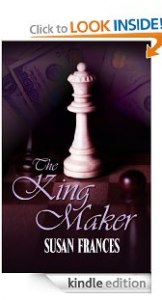Helping the Romance Writer Romance Her Readers
 A post by guest author, Susan Frances, author of The King Maker
A post by guest author, Susan Frances, author of The King Maker, on romancing the romance reader.
***
Every reader of romance novels has certain expectations before opening a book to its first page. Historical romances should give readers some sense of history. Time Travels need one moment when the main character goes back or moves forward in time. Mysteries must have a riddle that the reader has to solve. Paranormal fiction must have at least one character with supernatural or paranormal abilities, and so forth. It’s expected of the writer to deliver what’s been promised. How many times have you read a book and felt gravely disappointed because it wasn‘t what you expected?
Romancing the reader is a widely held philosophy by romance writers to deliver what they promised to audiences.How does one go about romancing a reader varies, which is why you’ll find contrasting reviews about the same book. Fans of Nora Roberts embrace her story Chasing Fire while other reviewers found the writing to be flat. Readers who enjoy Stephenie Meyer’s Twilight series may not necessarily like all paranormal fiction. How are these decisions determined, you might ask? The same way a favorite movie is chosen or a favorite blanket. It meets the individual’s expectations.
Sometimes it’s the writer’s language which may appeal to readers and not actually the story.Readers often like Janet Evanovich because of her use of contemporary slang and comedic rapport between the characters while for others her language is a complete turn off. Other romance fans may prefer the classic style of Amanda Quick, a pseudonym for Jayne Ann Krentz. Her language is very proper making it a big hit or a total miss with audiences.
Vivid descriptions are another factor that’s part of the philosophy of romancing readers.While Dan Brown is a master at describing action scenes and visuals, Anita Shreve has a natural talent for describing her characters innermost emotions and thoughts making them human beings who are relatable to readers. Other writers like Kate Emerson and Michelle Moran write historical fiction with a focus on describing the political and social climate surrounding their characters.
Most readers will say they’re attracted to the subject matter.After all that’s the first inkling readers have about a novel, but before J.K. Rowling’s Harry Potter series was published, the only wizards, witches, and sorcerers people were interested in came from the Bewitched TV series. There was something about Rowling’s storytelling that attracted audiences and transcended popular subjects.
Besides using language and descriptions, romance writers must make the plot move so the characters don’t remain static. These are moments of enlightenment and transformation adding layers to a character and the plot. The actions of the characters must lead up to some type of growth. Whether it’s of a personal nature like in Patricia Yager Delagrange’s Moon Over Alcataz when her character Brandy Chambers realizes she has the strength to survive a failed marriage, or pertaining to the plot like in my own novel The King Maker when the reader discovers key information about the crime ring’s leader.
Romance writing is a very distinct breed of writingthat differs from other forms of writing, such as biographies and self-help books for instance. Where these types of books are based on facts, research and studies, romance novels are largely invented with one singular philosophy to follow which is to romance audiences. Through the use of language, descriptions and periods of growth, writers are able to romance audiences, and hence, meet their expectations.
Think about the last book that excited you. What were the elements that made it appeal to you? Likely it was the story’s aesthetics — the description, language, and evolution of the characters and/or plotline. Most likely, the excitement was in the breed of romance writing to romance audiences and to aim to meet their expectations.
***
 Born in Brooklyn, New York and raised in eastern Long Island, Susan Frances always enjoyed writing making several contributions to her high school literary magazine, The Lion’s Pen. Influenced by writers of epic novels including Colleen McCullough and James Clavell, Frances gravitated to creative writing. After graduating from New York University with a BA in Liberal Arts, she tried her hand at conventional jobs but always returned to creative writing. Since 1998, she has been a freelance writer and have contributed thousands of articles to various e-zines including: Yahoo Voices, Goodreads.com, Authors and Books (books.wiseto.com), TheReadingRoom.com, Epinions.com, Fictiondb.com, LibraryThing.com, Newsvine.com, Suite101.com, Jazz Times, Hybrid Magazine, and BookDepository.com. Her latest romance novel The King Maker
Born in Brooklyn, New York and raised in eastern Long Island, Susan Frances always enjoyed writing making several contributions to her high school literary magazine, The Lion’s Pen. Influenced by writers of epic novels including Colleen McCullough and James Clavell, Frances gravitated to creative writing. After graduating from New York University with a BA in Liberal Arts, she tried her hand at conventional jobs but always returned to creative writing. Since 1998, she has been a freelance writer and have contributed thousands of articles to various e-zines including: Yahoo Voices, Goodreads.com, Authors and Books (books.wiseto.com), TheReadingRoom.com, Epinions.com, Fictiondb.com, LibraryThing.com, Newsvine.com, Suite101.com, Jazz Times, Hybrid Magazine, and BookDepository.com. Her latest romance novel The King Maker has been published by Champagne Books and can be found on the publisher’s website, champagnebooks.com. More about Susan Frances at http://susanfrancesny.wordpress.com/.



